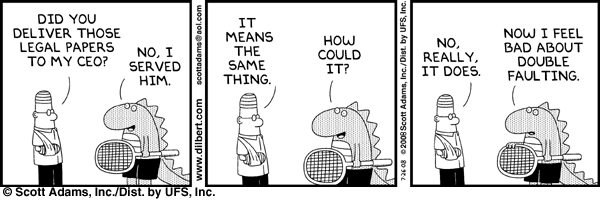I'm going to tell you a funny and true story that will reveal, for all you animal lovers, the true quality of canine lexical semantic competence. The story comes from my friend Moshe Vardi, who has a dog (a schnauzer, if you keep track of the different breeds) to which he has carefully taught various spoken commands. One of these commands is transmitted by uttering the English word down. When that command is issued, the dog obediently and immediately relaxes all four legs and drops to the ground, belly and genito-excretory organs in the dust.
Well, there came a day when a large pizza had been set on the table in preparation for the Vardi family's dinner, and for a few seconds, before people were seated, Moshe's wife foolishly left the room unguarded. When she returned from the kitchen, she was shocked to see the dog up on the table, standing over the pizza and licking at it tentatively.
"Down!", she commanded, in stentorian tones.
I rather fear you are ahead of me at this point. But let me just continue at my own pace and detail for you the denouement you probably already expect.
Read the rest of this entry »


